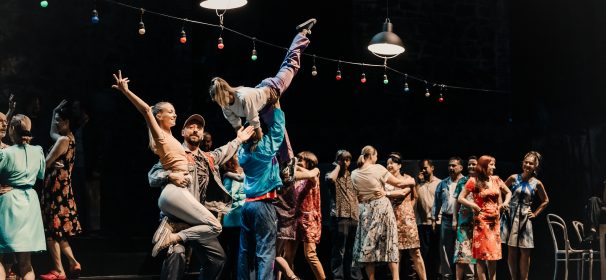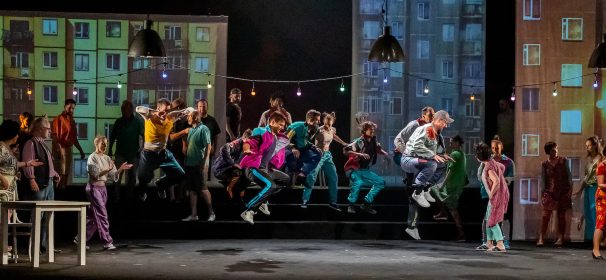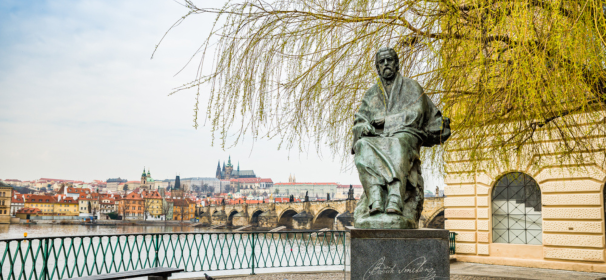For over 150 years, The Bartered Bride has occupied the top position among Czech operas. Said to be now part of the Czech DNA, its popularity eclipses that of any other feted Bedřich Smetana opera. Yet at the time when it came into being, in the 1860s, The Bartered Bride was a rather audacious experiment.
Smetana and the librettist Karel Sabina masterfully mocked all those who expected the “national opera” to be an idyllic picture of the Czech countryside, with its inhabitants being virtuous and governed by high morals. The Bartered Bride is thus far more humorous than “national”. Nonetheless, its humour is precisely of the type Czechs so love, and hence Smetana’s opera, abounding in irony, scathing, occasionally even cynical, wit, as well as tenderness and simple joie de vivre, has ultimately become “national” in the best sense of the word …
The National Theatre has presented many adaptations of The Bartered Bride, which has always been a staple of its repertoire. The 21st production of The Bartered Bride was entrusted to the film and stage director Alice Nellis. What prevails this time? Sentimental foregrounding of the life in a picturesque Czech village, or jest and the self-irony with which Smetana and Sabina imbued their opera? As interpreted by Alice Nellis, The Bartered Bride this time does not only poke fun at villagers of bygone times, but also at those who for generations have striven to find the formula for restaging the Czech “opera of operas“. Accordingly, the new production of The Bartered Bride does not only retell the story of Mařenka, Jeník, Vašek and Kecal, it is also about “how opera is made“ – how rehearsals proceed, how it gradually assumes a theatrical shape, how the director tries to make the opera “modern”, how the others frown at his endeavours, what can happen at the rehearsals, and how The Bartered Bride finally finds the right form – merry indeed, as well as moving and visually beautiful!
How rehearsals proceed, how the director tries to make the opera “modern”, what can happen at the rehearsals, and how The Bartered Bride finally finds the right form – merry indeed, as well as moving and visually beautiful!
Act I
A fair begins in the village. The people gather in high spirits, rejoicing at the start of a festival. Yet Mařenka and Jeník are worried – today Mařenka is to meet the bridegroom her parents have chosen for her. She pledges to Jeník that she will not give him up and expects the same vow from him. It appears to her, however, that for some reason Jeník is hesitant and perhaps is thinking of another girl. She asks Jeník about his past, which no one seems to know much about. Jeník tells her that his stepmother forced him to leave home and he had to struggle along in the world on his own. They promise undying love and fidelity in spite of everything bad they might face.
The marriage broker Kecal, together with Mařenka’s parents, the Krušinas, approaches. Kecal tries to gain their confidence and convince them that the son of the rich farmer Mícha from the neighbouring village would be the best match for Mařenka. He also reminds Krušina of his old debt to Mícha and the pledge to give his daughter to his son. It is to be Vašek, who Kecal describes in glowing terms. Overwhelmed by Kecal’s eloquence, the Krušinas ultimately agree. But Mařenka, who joins the talk, is against it. She scoffs at the agreement between her parents and Kecal, and announces that she already loves someone and will not give him up. Neither appeasement nor threat helps, hence Kecal decides to arrange the matter with Jeník in person. In the meantime, the festivities are in full swing, people are dancing a merry polka.
They promise undying love and fidelity in spite of everything bad they might face.
Act II
The entertainment continues with beer. The drinkers sing the praises of it. Jeník, however, rates love above everything. Kecal tells Jeník about the vast amount of money that is there for the taking. Kecal takes Jeník aside and another dance starts.
Vašek arrives in the village. Yet he is nothing like the “respectable and noble bridegroom” Kecal has described, but a shy, childishly naive young man and, what’s more, he stutters. Both excited and embarrassed that his parents are to marry him off, he has no idea what is awaiting him. Mařenka – whom Vašek has never set eyes on before – approaches him and warns him that the Krušinas’ daughter will make his life hell and that another girl longs for him. The simple-minded Vašek believes her and says that if the girl is as pretty as Mařenka he will marry her.
The simple-minded Vašek believes her and says that if the girl is as pretty as Mařenka he will marry her.
Meanwhile, Kecal tries to persuade Jeník to give up Mařenka in return for money and a certain rich girl. When Jeník refuses all proposals for “compensation”, Kecal threatens that he, as a non-resident, will be banished from the village. Only when Jeník realises again that Kecal is acting on behalf of Mícha and his son does he change his mind and agree to give up Mařenka, for three hundred florins. He even wants to sign a contract with Kecal explicitly stipulating that Mařenka can only be married to a son of Mícha which would at the same time cancel the Krušinas’ debt. Kecal leaves in order to draw up the contract and Jeník mocks him from afar. Of course, he will never give up Mařenka! Nevertheless, he signs the contract with Kecal before the eyes of the horrified villagers acting as witnesses, thus selling Mařenka for three hundred florins.
Act III
The muddleheaded Vašek despairs – according to his parents’ wish, he will have to marry Mařenka, who will harass him to death! However, he is distracted from this gloomy thought by a travelling circus that has just arrived in the village. The ringmaster calls the people together, promises a spectacular performance and shows some of the acts off immediately. Vašek is thrilled and speaks to the dancer Esmeralda. However, the ringmaster finds out that the circus’s main number, a cancan with a “live” bear, cannot take place – Franta, who plays the bear, has drunk so much that he is not able to stand up straight. The ringmaster looks for someone else to fill the bear suit and spots Vašek – just the right size. He and Esmeralda persuade Vašek to dance as the bear.
Vašek confides to his mother Háta that he is afraid of Mařenka. Not even Kecal and Mícha are able to talk him into marrying her – Vašek does not want Mařenka. Kecal and the Míchas suspect that Vašek has been got at and their deal is imperilled. Vašek himself confirms this when, face to face with Mařenka, he reveals that it was she who warned him against “Mařenka”. Everything is explained, all they have to do now is persuade Mařenka. She wants to be left on her own to think things over. She cannot believe that her beloved could have deceived her so cruelly.
The muddleheaded Vašek despairs – according to his parents’ wish, he will have to marry Mařenka, who will harass him to death!
Jeník arrives, wanting to explain to Mařenka how it really was with selling her. The seething Mařenka refuses an explanation. An argument starts, which is joined by Kecal. Jeník promises him that he will talk Mařenka around, and proceeds to describe to her how happy she would be with “Mícha’s son”.
Everyone is eager to hear how Mařenka has decided and she tells them that she will obey her parents. Yet Mícha recognises in Jeník his first-born son – and the latter claims his right: according to the contract, Mařenka is his bride. After realising that he has been duped and made a laughing stock, Kecal leaves with his tail between his legs. At that moment, everyone is terror-struck – the circus bear is at large! The beast, however, turns out to be Vašek dressed in his costume ready for the performance. The furious Háta upbraids him for being so stupid and drags him off. Mícha reconciles with his eldest son and everyone rejoices that Jeník has won his Mařenka.




